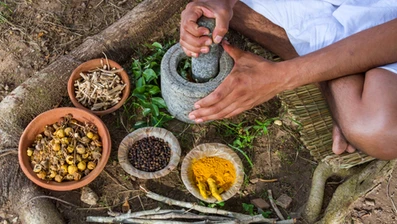Are you holding back on exploring the world of benefits ayurveda has to offer to your mind, body and spirit? Let us dismantle some common myths that are instrumental in making it hard for you to switch to ayurveda.
Read on and get ready to bust some myths!

Ayurveda is an ancient traditional Indian system of medicine, which is around 5000 years old and has stood the test of time because of it’s effective treatments, natural medicines and tremendous results. There was a time in the recent past when the push for modern medicine began turning this age old science into an elusive discipline but there has been a recent surge in the number of people returning to this ancient science of health and wellness. Of course, some still propgate myths about ayurveda that are very easily debunkable.
Let’s dispel some of the common myths associated with Ayurveda
Myth #1 – Ayurvedic medicine takes longer to work and is not very effective
Fact: Ayurvedic medicines don’t merely alleviate symptoms; instead they work on removing the underlying cause of the disease and if the recommeded treatment plan and lifestyle changes are followed properly, great results can be observed in a short period of time as well. People tend to try Ayurvedic medicine only after trying other medication, and this can sometimes delay the effect of Ayurveda. If it is adopted from the onset of an illness or disease, the results are seen sooner. The time needed to cure patients depends on several factors, including how soon the problem was diagnosed, its severity, as well as how readily the body reacts to the remedy.
Myth #2 – Ayurveda is an outdated system
Fact: Many people think of Ayurveda as an ‘exotic’ system of medicine not relying on scientific facts. However, Ayurveda has existed in our country for more than 5000 years and is still practised today due to its efficacy. It is a well-recorded form of medicine, and clinical trials and researches were widely conducted in ancient times. It was refined over thousands of years, using observation and experience— the fundamental principles of science. The old books record the diagnosis of diseases, as well as detailed facts about foods, herbs, and minerals in detail. In recent decades, with the increased realization of the importance of a holistic lifestyle and healthy eating, Ayurveda has seen a resurgence and is being accepted far and wide.
“Science of yoga and ayurveda is subtler than the science of medicine, because science of medicine is often victim of statistical manipulation.”
Myth #3 – Ayurveda medicines lack clinical testing
Fact: The truth is that firm guidelines have been established for quality control and standard of Ayurvedic medicines in the country. The Pharmacopoeial Laboratory of Indian Medicine (PLIM) and Central Council of Researches in Ayurvedic Sciences (CCRAS) has published the ‘Protocol for Testing of ASU Medicines’. Moreover, Rule 160 has been instituted in Drugs and Cosmetics Rules 1945 for quality control and standard of ayurvedic medicines, which ensures the establishment of drug testing laboratories throughout the country. It is mandatory for manufacturers of Ayurvedic Medicines to get certified from these laboratories regarding the quality and stability of their product. However, it is best to buy Ayurvedic medicines from registered Ayurvedic practitioners and trustworthy brands.
Myth#4 – Ayurvedic treatments do not need a doctor
Fact: If someone gets cured by ayurvedic medicine, they advise others also to try the same. But the truth is that for specific diseases, ayurvedic treatment is based on ‘Prakriti,’ i.e. the constitution of the person’s body. Thus, blindly taking ayurvedic medicine prescribed by someone else, or opting for home remedies based on an internet search, can cause more harm than good. Instead, you should visit a registered ayurvedic practitioner.
Myth #5 – Home remedies are the same as ayurvedic treatment
You should remember that even some of the best naturally derived ingredients may at times need to be processed in a lab to isolate the good compounds and remove the bad. For example, while citrus ingredients like lime may have good antioxidants, their direct use may make skin sensitive to sun damage. Also, several essential oils need to be used with caution in particular amounts. It may not always be possible to maintain exact proportions of ingredients in home remedies, and thus right ayurvedic formulations that are made by a qualified and experienced ayurvedic practitioner are recommended.
You may also read about 5 Common Myths About Ayurveda That Are Just Not True
Start your Ayurveda journey with us
At SKK Ayurveda and Panchakarma, we prescribe the most effective and safest ayurvedic treatments that are tried and tested to bring great results. Our medications are pure, authentic and hand made under the supervision of our expert doctors Dr. Tarun Gupta and Dr. Rani Gupta All treatments are based on complete prakriti evaluation to best suit your individual needs because we know that a ‘one glove fits all’ approach is not true to the authentic principles of ayurveda.
Book a consultation with us now, and discover how ayurveda can enrich your life.

